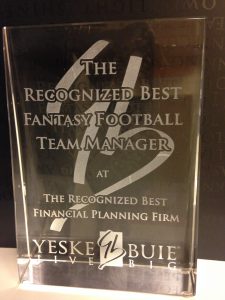Investing Lessons from Fantasy Football


Game Day Plan
It is estimated that nearly 75 million Americans will play fantasy football this season. If you aren’t planning to play in a fantasy football league this year (and the odds are if you play in one, you will probably play in multiple leagues), then you almost certainly know someone who is playing. Fantasy football has been around since 1963 when Wilfred Winkenbach, a limited partner in the Oakland Raiders, founded the Greater Oakland Professional Pigskin Prognosticators League. The game really took off, however, in the late 1990s; all major sports media websites began offering competing versions of the game by the start of the 21st century.
A typical fantasy football roster has 16 slots, and leagues range in size from 8 to 12 teams. Each team’s manager names 9 players as starters each week and competes against their opponent’s starting lineup; each team’s respective players’ statistics are compiled to determine the team’s aggregate weekly score. The remaining 7 players on each roster sit on the bench, and their stats do not count toward the team’s score. It is the manager’s job to determine who should start or sit each week. Standard fantasy league rules stipulate that starting lineups are configured as follows:
- 1 Quarterback
- 2 Running Backs
- 2 Wide Receivers
- 1 Tight End
- 1 Defense/Special Teams
- 1 Kicker
- 1 Flex Player (can be a Running Back, Wide Receiver, or Tight End, depending on league rules)
Yeske Buie has had a fantasy football league for the past four years. The league has become increasingly competitive over the last few seasons, especially with the addition of a trophy for the winner and a different kind of “prize” for the loser. Past winners include current team members Cristin Etheredge, Dorothy Navales, and Yusuf Abugideiri (Yeske Buie’s most ardent sports fan). In light of the upcoming season, Yusuf put together his thoughts about investing lessons that can be learned by playing fantasy football:
- Don’t Overvalue Glamour: Just as a diversified portfolio may include some glamour stocks (i.e. stocks trading at valuations higher than the average) as a part of a broad market index, a functional fantasy football team must have a quarterback. Quarterback is the most highly paid position in the NFL, but that doesn’t directly correspond to their priority regarding fantasy draft status; just because something is expensive doesn’t mean it’s commensurately valuable.
- Don’t Undervalue Low-Cost Investments: Research shows that, over the long run, value stocks (i.e. stocks trading at valuations lower than average) tend to outperform glamour stocks, and Yeske Buie’s portfolios are designed to capitalize on that. Similarly, a good fantasy football manager looks to add undervalued players (rookies or players new to their roles) to his/her roster with the aim of “buying low and selling high”.
- External Factors Matter: Just as the markets can be influenced by geo-political considerations, non-football factors must be taken into account when configuring one’s starting lineup. A good manager must consider the weather in which the player will be competing, as well as nuances like distance traveled (ex. players from West Coast teams are notorious for performing poorly in early afternoon games on the East Coast, as their body clocks are still adjusting to the time difference). Of course, in the end, no matter how much one may try to manage these external factors, the results are driven more by random chance than anything else.
Yusuf’s approach to managing his fantasy football team is similar to that of an active investment manager trying to pick “hot stocks” (an approach that has consistently failed to beat the market over time) constantly churning his roster and looking to capitalize on a hot tip. While Yusuf believes that doing so in a fantasy environment can be justified because, as he puts it, “the potential benefits outweigh the costs because there are no costs,” we must nonetheless observe that, while he finished first in 2014, Yusuf came in dead last in 2013. An example, we think, of the relative importance of skill versus random chance. And, of course, when it comes to real-life investing, costs matter and trying to beat the market is an expensive enterprise. The best approach to investing accounts for the aforementioned “lessons,” and is one with which Yeske Buie’s Clients have grown familiar: diversify amongst and across asset classes, control costs, and rebalance in a disciplined fashion.
Random chance or skill? You be the judge!


